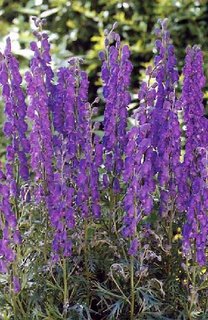Tuesday, January 19, 2010
Sunday, June 04, 2006
Aconitum napellus

Common name: Aconite, friar’s cap, monkshood, mousebane, wolfsbane
Description: Aconitum grows in the damp conditions of alpine meadows. It is a native plant of Switzerland and other mountainous regions of Europe. Tubers developed from its root system, which produced tall, upright stems that bore attractive purple/dark blue flowers. Ancient hunters used its sap, which is highly poisonous, and placed it on the ends of their arrows. ‘Wolfsbane’ refers to this use, and Aconitum is derived from the Latin word acon, meaning ‘dart’. Hahnemann extensively tested and proved this homeopathic remedy. He used it for the acute infections and fevers, accompanied by severe pain, that were usually treated by blood-letting by the physicians of his day. This remains its main use in modern homeopathy, and the whole plant is used to produce the remedy.
Uses: Aconite is a valuable treatment for acute illnesses of rapid onset in people who have previously been healthy and well. These often occur after the person has been out in cold wet weather. It is used especially at the start of feverish respiratory infections, such as colds and influenza and those affecting the eyes and ears. The person usually experiences restlessness, a hot, flushed face, muscular pains and disturbed sleep but may be pale when first getting up. It is also used to treat the menopausal symptoms of hot flushes. It is an effective remedy for some mental symptoms, including extreme anxiety and fear, palpitations and attacks of panic, especially the belief that death is imminent during illness. The remedy encourages sweating and is sometimes used in conjunction with BELLADONNA. Symptoms are made worse by cold, draughts, tobacco smoke, stuffy, airless, warm rooms, listening to music at midnight and by lying on the painful part. They improve out in the fresh air and with warmth. The people who benefit from Aconite are typically strong, solid or well-built, high-colored and usually enjoy good health but have a poor opinion of themselves. Because of this, they tend to have a constant need to prove their own worth, to the point of insensitivity or unkindness to others. When in good health, Aconite people have a need for the company of others. However, they also have fears that they keep concealed and may be frightened of going out or of being in a crowd. When ill, they are inclined to be morbid and to believe that death is imminent, and they cope badly with any kind of shock.
Source: Guide to Homeopathy by Geddes & Grosset
Saturday, June 03, 2006
OVERVIEW
The homeopath treats illness as a sign of disorder or imbalance in the body, making use of signs and characteristics in the patient that conventional medical practitioners would deem irrelevant.
This blog is a detailed account of the major and minor remedies available in homeopathy, the most respected branch of complementary medicine. As well as providing a short history of this important medicine, this also contains a useful index of complaints and disorders.
